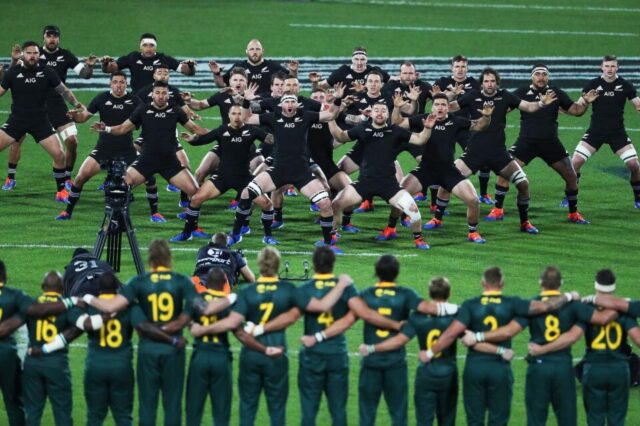New Zealand have a sizeable lead in the head-to-head with 62 wins to South Africa’s 39 in 105 matches and are the only nation the Springboks have a negative win-loss ratio against.
Nick Said, in Cape Town – For New Zealand and South Africa there is no bigger challenge than what both consider rugby’s greatest rivalry and the World Cup final on Saturday will be among their most significant clashes with each team seeking a record fourth global title.
The rich history of this 102-year-old fixture has seen political turmoil, countless bruising battles, a previous World Cup final and even a 0-0 draw.
New Zealand have a sizeable lead in the head-to-head with 62 wins to South Africa’s 39 in 105 matches and are the only nation the Springboks have a negative win-loss ratio against.
Conversely, however, New Zealand’s lowest win percentage versus any opponents (59%) is against the Springboks.
It all comes down to this – a date with destiny 🏆🇿🇦#StrongerTogether #Springboks #RWC2023 pic.twitter.com/whFfcudP1P
— Springboks (@Springboks) October 23, 2023
South Africa captain Siya Kolisi calls it “the biggest sporting rivalry in history” while former New Zealand winger Jeff Wilson believes it is a thread that connects the two nations.
“It is such an important part of the two countries and how they are connected,” Wilson said. “It is competitive on the field, but you can see off it there is a healthy respect.”
They first met in 1921 when South African embarked on a tour of Australia and New Zealand, with a three-match Test series drawn, the third game finishing 0-0.
That last match was played in horrendous conditions but the tour would be the start of a love-hate relationship that endures.
Heading into familiar territory 💪
Always a battle against @springboks at Rugby World Cups#AllBlacks pic.twitter.com/HSpQ0LE1On
— All Blacks (@AllBlacks) October 23, 2023
Tours controversially continued through the Apartheid era until 1981, when South Africa visited New Zealand for a series of three Tests that were interrupted by protesters.
South Africa’s presence in New Zealand split opinion in a mix of politics and sport, even as the Springboks relaxed their all-white selection policy to include a single Black player in flyhalf Errol Tobias.
New Zealand won the series 2-1, claiming the third test 25-22 as flour bombs were dropped onto the field and violence erupted outside the stadium.
Tour Controversy
A selection of New Zealand players dubbed the “Cavaliers” toured South Africa in 1986, sporting an all-black kit, albeit with a yellow trim.
An official tour had been planned for 1985 but was called off after a legal challenge in New Zealand, and of the 30 players who were to be on that trip, 28 were part of the Cavaliers.
South Africa won the unofficial Test series 3-1 with both teams at near full-strength.
The Springboks returned to the international fold in 1992 and faced New Zealand in the World Cup final in Johannesburg three years later.
We meet again… #RWC2023 pic.twitter.com/jDx4iTtsPK
— All Blacks (@AllBlacks) October 21, 2023
The home side, inspired by the presence of president Nelson Mandela, completed an epic 15-12 extra-time victory over the more fancied All Blacks thanks to a winning drop-goal from flyhalf Joel Stransky.
They have met five times at the World Cup, with New Zealand claiming three victories to two for the Springboks.
South Africa have won three of the last five clashes, including inflicting a record Test defeat on their great rivals with a 35-7 victory in London in August this year.
Reuters






